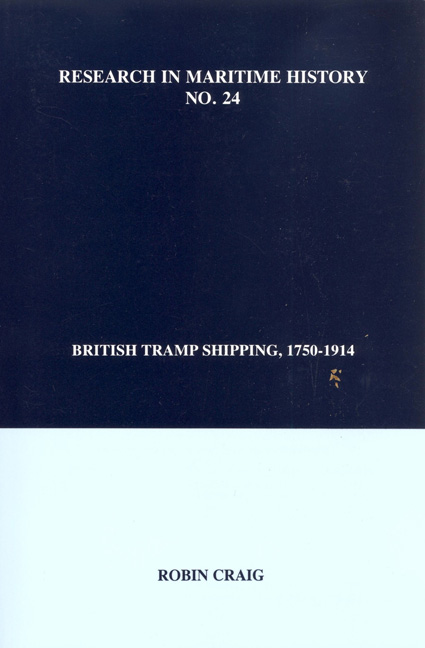Book contents
- Frontmatter
- Contents
- Introduction
- Tramp Shipping and Ownership
- The Trades
- The Seamen
- Tramp-Shipping Regions
- A. Wales
- B. The Northwest
- “Some Aspects of the Trade and Shipping of the River Dee in the Eighteenth Century”
- “Shipping and Shipbuilding in the Port of Chester in the Eighteenth and Early Nineteenth Centuries”
- C. The West Country
- D. The Northeast
- E. The Southeast
- F. The British Empire: Maritime Canada
- Bibliography
“Some Aspects of the Trade and Shipping of the River Dee in the Eighteenth Century”
from B. The Northwest
- Frontmatter
- Contents
- Introduction
- Tramp Shipping and Ownership
- The Trades
- The Seamen
- Tramp-Shipping Regions
- A. Wales
- B. The Northwest
- “Some Aspects of the Trade and Shipping of the River Dee in the Eighteenth Century”
- “Shipping and Shipbuilding in the Port of Chester in the Eighteenth and Early Nineteenth Centuries”
- C. The West Country
- D. The Northeast
- E. The Southeast
- F. The British Empire: Maritime Canada
- Bibliography
Summary
It is a commonplace of maritime history that the port of Chester, in the Middle Ages a considerable haven with strategic as well as trading significance, did not expand in the eighteenth century, as did the neighbouring port of Liverpool. The contrast between the two ports was very marked: the number of ships belonging to Liverpool which entered and cleared that port in 1709 totalled 6381 tons, and the total had risen to 29,543 tons by 1782. Similar returns for the port of Chester show a decline from 2659 tons in 1709 to 1070 tons in 1782. Much well-merited attention has been paid to the growth and importance of the port of Liverpool, but little study has been devoted to Chester, apart from the scholarly outline of the customs administration of the port by Mr. R.C. Jarvis. This paper does not discuss the appointment and customs administration of the port in the eighteenth century, but seeks instead to give some account of the trade and shipping of the River Dee in the period which saw the rise to prominence of its neighbour and rival, Liverpool.
Navigation of the River Dee
The greatest factor bringing about the relative decline of the port of Chester was the poor channel through the sands of the River Dee. Had the river been confined within a narrow estuary, as was to some extent the case with the Mersey, it is possible that navigation might have been very much easier, since the scour created by the flow of the Dee would have served to keep the channel relatively free; but the sands of the estuary were unconfined and tended to shift with every variation of wind and weather. The difficulty of navigating such a devious and inconstant channel limited the trade of the port, for larger vessels were in constant danger of becoming beneaped and shipmasters and owners must have displayed increasing reluctance to risk the delay or loss of ships and cargoes. Such a situation, if prolonged, might well have led to the merchants of Chester paying a premium on freight and insurance: thus improvements became a matter of urgent necessity.
- Type
- Chapter
- Information
- British Tramp Shipping, 1750–1914 , pp. 261 - 292Publisher: Liverpool University PressPrint publication year: 2003

